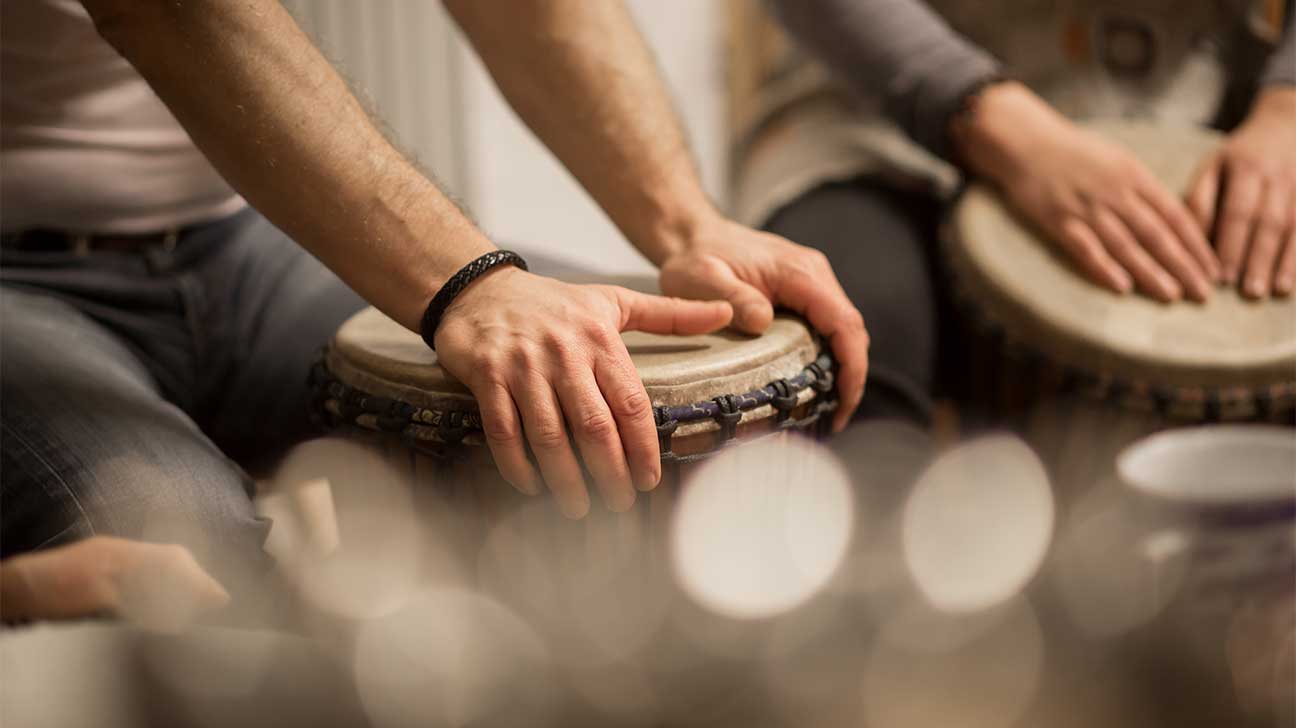
Music therapy is considered an effective alternative treatment for a variety of behavioral and mental health issues, including substance abuse.
This type of therapy is accomplished by listening to music, playing instruments, singing, or songwriting individually or among a group of therapists and peers.
Research suggests that people who engage in music therapy during addiction treatment will benefit from having a creative outlet for expressing feelings and emotions.
Benefits Of Music Therapy In Substance Abuse Treatment
Music therapy has been shown to help clients emotionally, socially, psychologically, and cognitively.
While it won’t cure addiction, there are a number of ways that a treatment plan that includes music therapy can assist people during the recovery process.
Listed below are some of the most common benefits.
1. Pain Reduction From Substance Use Withdrawal
People who engage in drug and alcohol abuse may experience a host of painful withdrawal symptoms when they stop using the substance.
Music therapy has been shown to reduce the physical and emotional discomfort of withdrawal symptoms, including headaches, nausea, and muscle pain.
2. Increases Motivation Among People With A Co-Occurring Disorder
Mental illness and addiction have been found to be intrinsically linked, and people with dual diagnoses typically have worse treatment outcomes than those without mental health issues.
Pilot studies have shown that people with a co-occurring disorder are more motivated to continue their addiction treatment program when exposed to music therapy.
3. Encourages Relaxation
Achieving sobriety is hard, and many people will experience intense anxiety and depression as a result of stopping their substance use.
Listening to or creating music can help lower blood pressure and encourage a meditative state, which helps relieve stress and some symptoms of depression.
4. Helps Build A Strong Support Group
Music therapy sessions are commonly conducted with a group of people, including therapists and other individuals recovering from trauma or addiction.
When combined with cognitive behavioral therapy (CBT), music therapy conducted with a group has been shown to promote strong cohesiveness among clients, regardless of age or background.
5. Assists With Concentration Levels And Memory
Researchers have discovered that people who listen to music before attempting to accomplish a task have a better memory than people who sat in silence.
People can benefit greatly from an increase in memory and concentration capacity, particularly if they’re currently taking prescription medications for a mental illness.
6. Promotes Restful Sleep
One of the most important factors during an addiction recovery program is ensuring that the person in treatment is getting plenty of restful sleep.
Listening to music helps alleviate boredom and decrease racing thoughts, which can promote falling asleep easier and staying asleep throughout the night.
7. Promotes Better Self-Esteem And Self-Expression
Engaging in artistic endeavors such as creating music or simply listening to music can help people identify and express their feelings, and work as an emotional release.
People who develop healthy self-awareness can better understand the cycle of addiction and identify their own triggers.
Who May Benefit The Most From Music Therapy?
Music therapy has been shown to help people regardless of their age, culture, or previous life experiences.
Groups who may especially benefit from music therapy include:
- people with a substance use disorder
- veterans with post-traumatic stress disorder
- autistic people
- victims of past trauma
- people with mental health disorders such as depression or bipolar disorder
- people who experience chronic pain
Other Treatment Options For Addiction
Upon entering a drug rehab program, clients will have access to a number of evidence-based or holistic therapies to help them achieve long-term sobriety.
Common behavioral health services may include:
- inpatient treatment programs
- outpatient treatment
- drug addiction therapy
- general healthcare services
- medication-assisted treatment (MAT)
- drug and alcohol detox
- aftercare
- art therapy
- sober living homes
- case management or wellness services
If you or a loved one are interested in a music therapy program, contact the addiction treatment center of your choice and ask about their therapy techniques.
Find Substance Use Disorder Treatment Today
Reach out to FreeRehabCenters.net today and learn more about addiction recovery centers that may work for you.
Published on February 1, 2023
Free Rehab Centers aims to provide only the most current, accurate information in regards to addiction and addiction treatment, which means we only reference the most credible sources available.
These include peer-reviewed journals, government entities and academic institutions, and leaders in addiction healthcare and advocacy. Learn more about how we safeguard our content by viewing our editorial policy.
- American Music Therapy Association
https://www.musictherapy.org/about/therapists/ - Journal of Music Therapy
https://academic.oup.com/jmt/article-abstract/27/4/195/898366?login=false - National Institute of Health (NIH)
https://www.ncbi.nlm.nih.gov/pmc/articles/PMC4268880/ - Taylor and Francis Online
https://www.tandfonline.com/doi/abs/10.1300/J069v27n01_05
